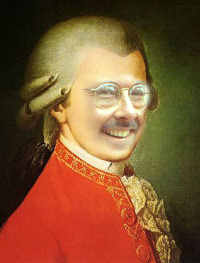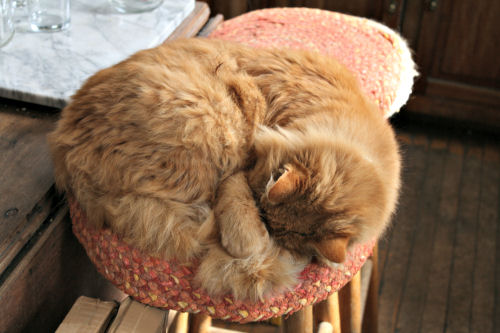A 365-Day Project
"We Are All Mozart"
A project to create
new works and change
the perception of the
music of our time.


 May 25, 2008
May 25, 2008 
In reading an article in today's New York Times Magazine, I realized that, despite having had computers around me since 1978 and having been online since 1981, I am not really part of this online generation, having never been stalked nor invited it, never brewed kombucha tea nor said 'whatever' with anything but referential irony, having no interest in television shows and end-cap magazines about celebrities, and (though I think she is very funny) with most of Kathy Griffin's famous-D-list-people jokes going past me, and my entire knowlege of American Idol coming from trailers. In fact, feeling my life must be part of an increasingly irrelevant generation, I read that entire "Exposed" article to elicit some nuggets of significance, and found just one: The author used "I" 400 times and "me" a mere 50 -- always the subject, rarely the object, and a fanatical subject-ness at that (one so fanatical that it was impossible not to count "I" occurrences). It was a sad generational tale with no redemption. Mea culpa? Not likely.
Certainly I am self- rather than other-driven, and other- rather than self-committed. I don't live vicariously through others' blogs any more than travel stories were attractive in the paper days. I don't use cut-and-paste tools for my blog or for my life. Even these commentaries -- which I in fact resisted calling a blog for over a year -- do not use someone else's template. No Blogger, no Blogspot, no Wordpress. The order is linear, with the oldest entries first. I rarely post personal details about my life nor gossip about others, no dreams from last night nor expectations over lunch. Sure, there are pictures of cats and construction, flowers and travels, trains and concerts, but they're the comic relief of my little life. I'm a hard-work Puritan-ethic old guy who's not very interesting.
Which brings me to Daniel Wolf's blog of January 22 that is worth revisiting. He wrote, "I'm all in favor of putting our disputes out in the open -- at the moment, we pretend in public as if there are no controversies and let those in positions of power manage our disputes through the quiet backroom processes of handing out scholarships, jobs, awards, and commissions. The illusion of harmonious getting along for getting along's sake contribute, however, to the false public impression that there is no heat, no passion, no action, and no innovation in our field. This is bad for the public life of our music. Simultaneously, the reduction of debate to the distribution of our pitiful spoils is bad for the life of the music itself, not to mention the livelihoods of those eclipsed by any local or temporal orthodoxy."
Okay, Daniel, you're on. Here's why there's no debate. Music is easy. Its actual content is insubstantial. It is about clever noises, and all the numerical pomp brought into it by modernists or discovered in the baroque by musicologists is as meaningless as the educational spout that claims music offers the benefits of greater intellectual acuity or physical coordination. It makes no valuable contributions to human progress, it is pitifully self-referential, it is a garbled and inconsistent means of communication, it has nothing to communicate but the personal and unarguable choices of the artists, and it is hardly worth that angst brought to it by so many nascent composers. Debate that and risk getting outed.
There. I've said it. Music doesn't create world peace or make a better sandwich.
Don't get me wrong. This isn't about nonpop -- it's about all music, from the dippy little ceremonial songs of religions through broke-car country songs through national anthems through gamelan to Paint It, Black and backwards from Be m'an perdut through Ma Bouche Rit to Gurre-Lieder. Okay, maybe a lullaby is an exception. At best it's about community, at middle about spectacle, at worst about nothing.
Stating that clearly does not deny that music may move people, may change perspective, may alleviate pain, and may respond to a yearning, albeit likely less consistently than ice cream, caviar or heroin.
So what's the problem? The self-aggrandizement of art, perhaps. I read Herbert Henck's 108-page deconstruction of Stockhausen's Klavierstuck X and wonder: If an algorithm were to move all the pitches randomly up and down a semitone or two, adjust the rhythms by fractional amounts either way, and re-chunk the structure, how differently would it be heard? Or, for that matter, analyzed? Would Henck suddenly find some sort of imaginative cloaking of the atomic material and point out that the plainness of the structure was imaginatively avoided by Stockhausen's genius? Many years ago I proposed the playing of classic works as avant-garde ones, that is, removing noteheads and rhythms and leaving the shapes and positions. Would a new piece actually be created? There is, after all, no perfect collection of notes, no Pythagorean theorum of symphonies, no structural arc and tangent without which a sonata will collapse and kill hundreds in a sonic disaster. Just because music can be analyzed to find precious details and interrelationships has never been shown to require those details and interrelationships to be effective. That a trained expert can find them does not mean that they matter other than to the composer and perhaps a few colleagues. It is the smoke and mirrors of air pressure, the idle decoration of sound waves, the divining rod of acoustic spectra.
Oh. That diminishes and demeans music and its practitioners, doesn't it? I suppose, yes. It diminishes them from art to craft, and starting over from there. Craft is the art of meeting expectation, while art is the craft of defying it. Genius is meeting one's own expectations while both meeting and defying others. (Notice the word "entertainment" has not entered this commentary.) Let's go back to tropes. Gregory had called in all the chant from around the Christian realm and gotten it stabilized, centralized, and consistent -- the sort of stuff that helps keep rulers ruling. Until the age of recording, the idea of singing the same-old same-old could be dulling for composers. So ornamentation of basic chants became the rage by the late middle ages, with composers adding their own words and sound to the deadly Gregorian heap: the sequences and the tropes. The problem with troping was that it did what Gregory was trying to avoid -- it decentralized the rule and mucked about with the clarity of the music and words. They were out of hand. Some sequences and tropes became cycles of mystery plays with dialog, sets, props, costumes, and stage directions. Something Had To Be Done. And was -- bam! the 16th century Council of Trent outlawed the added text of sequences (hey! you know this one: Dies Irae) and soon afterward the defiant troping withered along with its mystery plays. No more dramas between "allelu" and "ia". Henry VIII had a hand in it, too. It's a long story, but my point here is that rules are expectations, and sequences and tropes met and defied them at once.
Let's bring it to the present. Most of nonpop meets the composers expectations but -- but what? It neither meets nor denies external expectations because there aren't any. Ouch, yeah. Even our blogs just talk to each other. My Facebook friends are the same as every other composer's Facebook friends. (Plus, nobody's stalking me. What's up with that?)
* * *

Oranjeboom asleep. Take your theory to him. Is it tasty? Does it pet effectively? Does it ache to be pounced upon? Is it soft as a cushion and warm as a sunbeam? No? Then take it back.